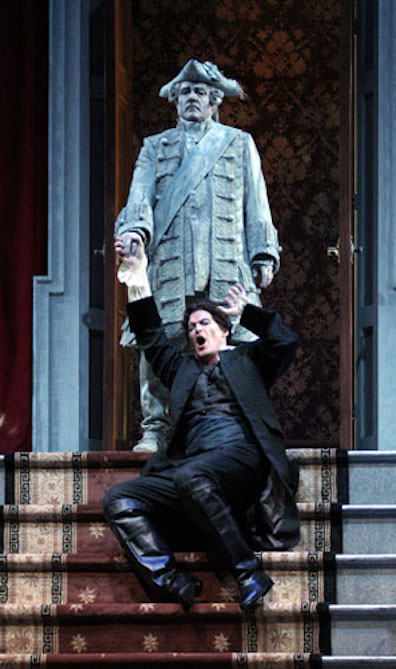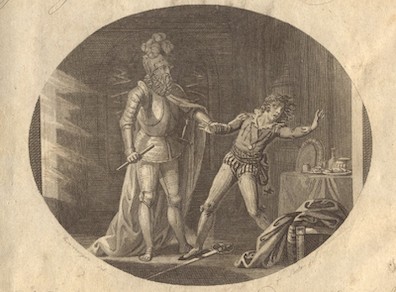In the Ormond dining room, Bloom hears Bob Cowley
playing some Mozart on the bar's piano: "Minuet of Don
Giovanni he's playing now. Court dresses of all
descriptions in castle chambers dancing. Misery.
Peasants outside. Green starving faces eating dockleaves. Nice
that is. Look: look, look, look, look, look: you look at us."
The famished faces belong to Irish peasants gazing at a rich
manor house, but Bloom's fantasy is triggered by hearing a
minuet from the scene where Don Giovanni throws a grand
festive ball in his house for some peasants. The largesse is
purely exploitative: in an earlier scene Giovanni has told
Leporello, "Now prepare a great feast until the wine heats
every head. If you find some girls in the square, bring them
along too. Let the dancing be wild: here a minuet, here a
folia, here an allemande will make them dance. And I meanwhile
will hearken to another tune, making love to this one and that
one. Ah! by tomorrow morning my
list should be a dozen longer."
In the ballroom scene that follows, he and Leporello urge the
peasants celebrating the marriage of Masetto and Zerlina to
enjoy the elegant refreshments that servants are handing out:
"Do take a drink, my fine young men." "Ho! some coffee!"
"Chocolate!" "Ices!" "Sweetmeats!" Giovanni caresses Zerlina
in front of her furious fiancé, dances with her, and then
pulls her into a secluded room to rape her, but his effort is
thwarted: she cries out, the partygoers break down the door,
and Giovanni is nearly brought to justice. In this scene food
and drink figure as images of, and accomplices in, Giovanni's
predatory sexual pursuits. His amoral indifference to the
welfare of his guests gives Bloom occasion to think of Irish
aristocrats who flaunted their wealth in front of starving
peasants.
At the end of the opera, feasting again signifies rapacious,
amoral appetite, but the feasting ends with the arrival of a
man whom Giovanni murdered at the beginning of the opera.
There, having attempted to seduce or more likely rape Donna
Anna in her own house, Giovanni flees into the night streets.
Confronted by her father, the Commendatore, he kills him. Much
later, he walks home through a church graveyard with
Leporello, laughing about his latest criminal exploits, and
sees a statue of the Commendatore which, remarkably, speaks:
"You will be done laughing by dawn." The inscription on the
statue's base delivers other ominous words: "Here I await
vengeance on the unholy man who drew me to my last step."
The rake responds with flippant defiance, spoken in the
language of food: "That old fool! Tell him that tonight I'll
expect him at supper with me (a cena meco)." He
bullies the terrified Leporello into relaying the message that
"my master...would like to sup with you (vorria con voi
cenar)." The statue nods assent, paralyzing
Leporello with fear, but Giovanni mocks him and delivers the
invitation himself: "Speak, if you can: will you come to
supper (a cena)?" The statue replies: "Yes." Two
scenes later, it knocks at the mocker's door and sings the
lines that Bloom remembers: "Don Giovanni, you invited me to
sup with you, and I have come (Don Giovanni, a cenar
teco / m'invitasti, e son venuto)."
Bloom walks down the street in Lestrygonians humming
these measures and "prolonging in solemn echo the closes of
the bars." Mozart's cadences for the Commendatore's basso
voice are indeed solemn: four thunderous pairs of half-notes
announcing that justice has arrived for Giovanni. Don Gio-
VAN-NI drops an octave from D to D, a ce-nar TE-CO
settles on an A in the middle, m'in-vi TAS-TI repeats
the drop from D to D, and finally e son ve- NU-TO, the
dramatic reply to the invitation, drops from the A to a
resounding low A an octave down. After three hours of futile
resistance to the seducer, an irresistible force has at last
appeared.
Bloom puzzles over one detail of the Italian text: "What
does that teco mean? Tonight perhaps."
It means "with you," but the rest of his English translation
is accurate: "Don Giovanni, thou hast me invited / To
come to supper tonight, / The rum the rumdum."
When the phrase "a cenar teco" recurs in Circe,
it reprises Bloom's thought in Sirens about
aristocratic oppression of peasants. Some "IRISH EVICTED
TENANTS" join the chorus of his accusers, and he sits in a
pillory whistling the music. Here, Bloom appears to identify
with the wicked nobleman (as any musically inclined listener
must!), adding Don Juan crimes to all the others that Circe
makes him confess to.
That justice comes for Giovanni at suppertime is no accident.
The ballroom scene has associated his erotic appetites with
feasting, and earlier in this climactic scene of Act 2
Giovanni has wolfed down food and wine while Leporello
marvels: "Ah, what a barbaric appetite! What giant mouthfuls!"
Giovanni's rapacious appetite makes him a giant among pygmies,
a Gothic barbarian ravaging polite society. The jilted Donna
Elvira enters, pouring out her romantic anguish one last time,
only to have Giovanni mockingly invite her to have a bite with
him: "Long live women and good wine, the support and glory of
mankind!"
When the Commendatore enters the same room moments later he
countermands Giovanni's order for more food: "Stay a moment.
He who eats heavenly food does not graze on mortal food." He
takes advantage of aristocratic etiquette to extend a
reciprocal invitation: "You invited me to supper: you know
your duty. Tell me: will you come to sup with me?" Never one
to display fear, Giovanni agrees and shakes the statue's hand
on the bargain. It proves to be an icy, unshakable death grip.
Apprehended at last, and fiercely rejecting the Commendatore's
demand to repent, he is torn by physical and spiritual
tortures and sinks into a fiery chasm. Supper at the statue's
place turns out to be a one-way trip to Hell.
Da Ponte's association of food with destructive sexual
predation seems well suited to the Homeric themes of Lestrygonians, but
Bloom does not think such thoughts. Instead, Joyce makes the
linkage more covertly throughout the novel. In Hades
Bloom sees Boylan going into the Red
Bank restaurant, perhaps to lunch on the oysters for
which it was famous, and in Lestrygonians he recalls
this sighting while reflecting on the supposed aphrodisiac
properties of oysters. In Wandering Rocks, an hour
before his appointment with Molly, Boylan enters a shop and
arranges for a gift basket to be sent to Eccles Street,
containing pears, peaches, a "small jar" of something, and a
bottle of port wine. In Ithaca Bloom sees the remains
of this wicker basket in his kitchen and finds flakes of Plumtree's potted meat in
his bed. Between bouts of potting his own meat in Molly,
Boylan has liberally stuffed his mouth.
Joyce leaves it to Molly to spell out the implied connection
between food and sexual appetite. The size, firmness, and
stamina of Boylan's member make her wonder not only if he
consumed oysters earlier in the day, but how many, and whether
his herculean copulative feats may have left him hungry
afterwards: "he must have come 3 or 4 times with that
tremendous big red brute of a thing he has...like iron or some
kind of a thick crowbar standing all the time he must have
eaten oysters I think a few dozen he was in great
singing voice no I never in all my life felt anyone had one
the size of that to make you feel full up he must have
eaten a whole sheep after." Boylan's enumerated orgasms
echo Giovanni's enumerated sexual conquests. His appetite for
food too seems similar.
Molly's quantitative awe at Boylan's fucking and his eating,
combined with her qualitative appreciation of his singing,
suggest a symbolic equivalence with Don Giovanni. The linkage
becomes undeniable if one asks what he was singing. In Ithaca
Bloom has seen several recently smoked cigarettes on the piano
in his parlor, not far from some sheet music for Love's Old Sweet Song.
Boylan appears, then, to have accompanied Molly in a
run-through of one of the two pieces scheduled for her
upcoming concert. It is a solo, but her other number, Là
ci darem la mano, is a duet. If this song too was
rehearsed, with Boylan singing the baritone part to Molly's
soprano, then he has taken the role of Don Giovanni at the
piano before imitating him in the bedroom.
Joyce found parts of da Ponte's libretto useful: the story of
one man courting another man's wife, and the linkage of sexual
appetite with food. Other themes—murder, vengeance, divine
justice—evidently did not interest him much. Bloom's
association of Giovanni's ball with starving Irish peasants
shows deep hostility to aristocratic oppressors, and his
humming of the "M'invitasti" bars suggests that he
would like to see adultery punished. But Bloom is no
commanding Commendatore, nor even a plucky Masetto. He fails
to confront either Boylan or his wife about their planned
adultery, and in Ithaca, after the deed is done, he
rejects various forms of "retribution": "Assassination,
never, as two wrongs did not make one right. Duel by combat,
no. Divorce, not now." Bloom supposes that adultery
ranks lower than "theft, highway robbery, cruelty to children
and animals," and 28 other specified crimes—hardly enough
cause to challenge a lusty nobleman to fight to the death.
But one element in the opera's logic of divine judgment may
have played some role in Joyce's imagination when he was
writing Ulysses. The statue repeatedly demands that
Giovanni "Repent" ("Pentiti, cangia vita...Pentiti,
scellerato...Pentiti") and Giovanni repeatedly refuses
("No, no, ch'io non me pento...No, vecchio infatuato...No!").
This authoritative religious demand for repentance, met
with heroic secular defiance, finds an evocative analogue in
the climactic passage of Circe where Stephen's dead
mother demands that he repent ("Repent, Stephen...Repent! O,
the fire of hell!") and Stephen batters back at the judgmental
mirage ("The ghoul! Hyena!...His noncorrosive sublimate! The
corpsechewer! Raw head and bloody bones"). For Joyce, a
vengeful God's demand to repent one's human choices was the
uncrossable bridge. Whether God exists or not, whether
Catholic teachings are defensible or not, were questions that
did not provoke him. But, like Giovanni, he could ill afford
to renounce the momentous choice that had constituted him as a
person and an artist. To the orthodox demand to Repent!, he
said No!




